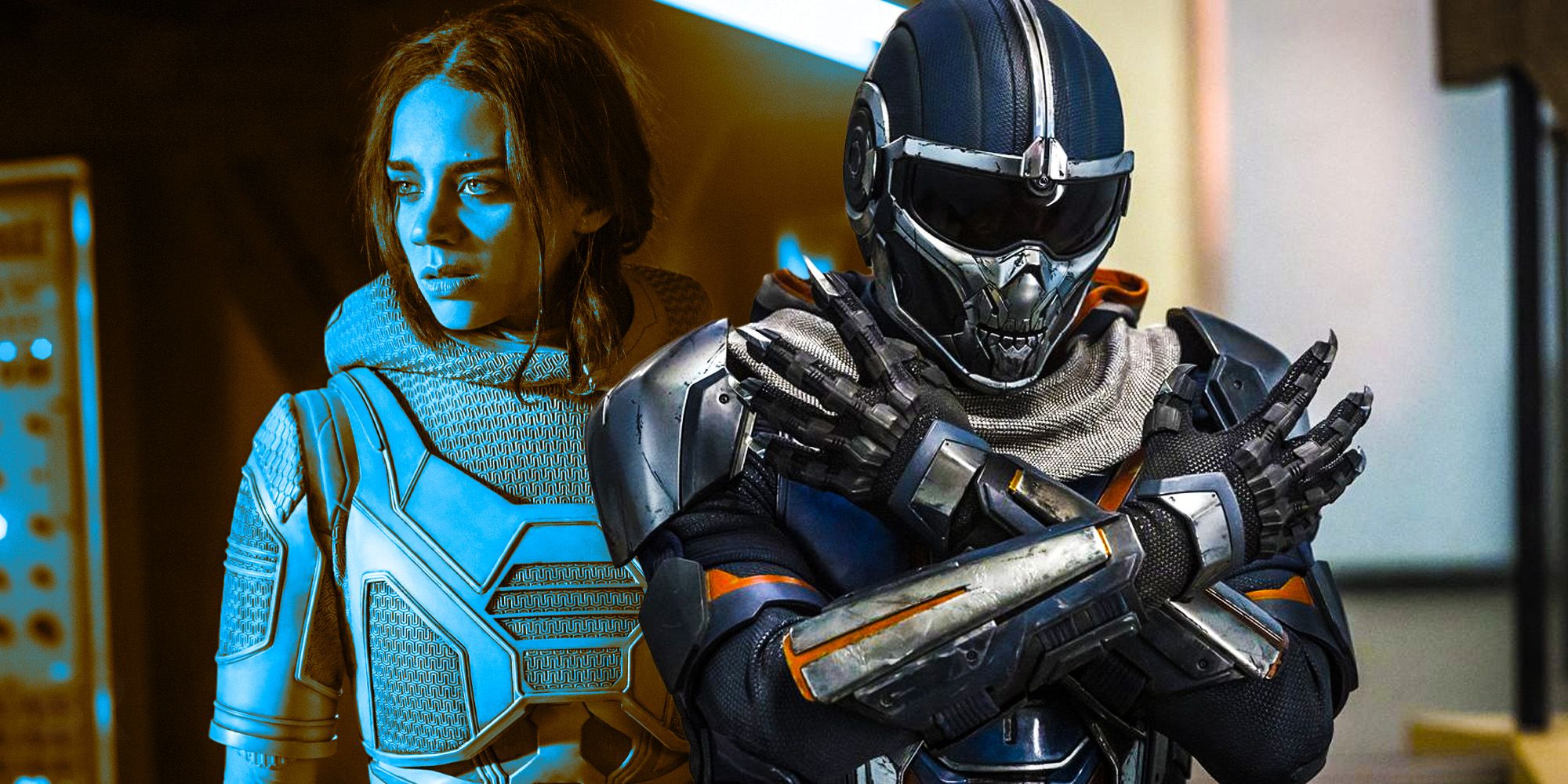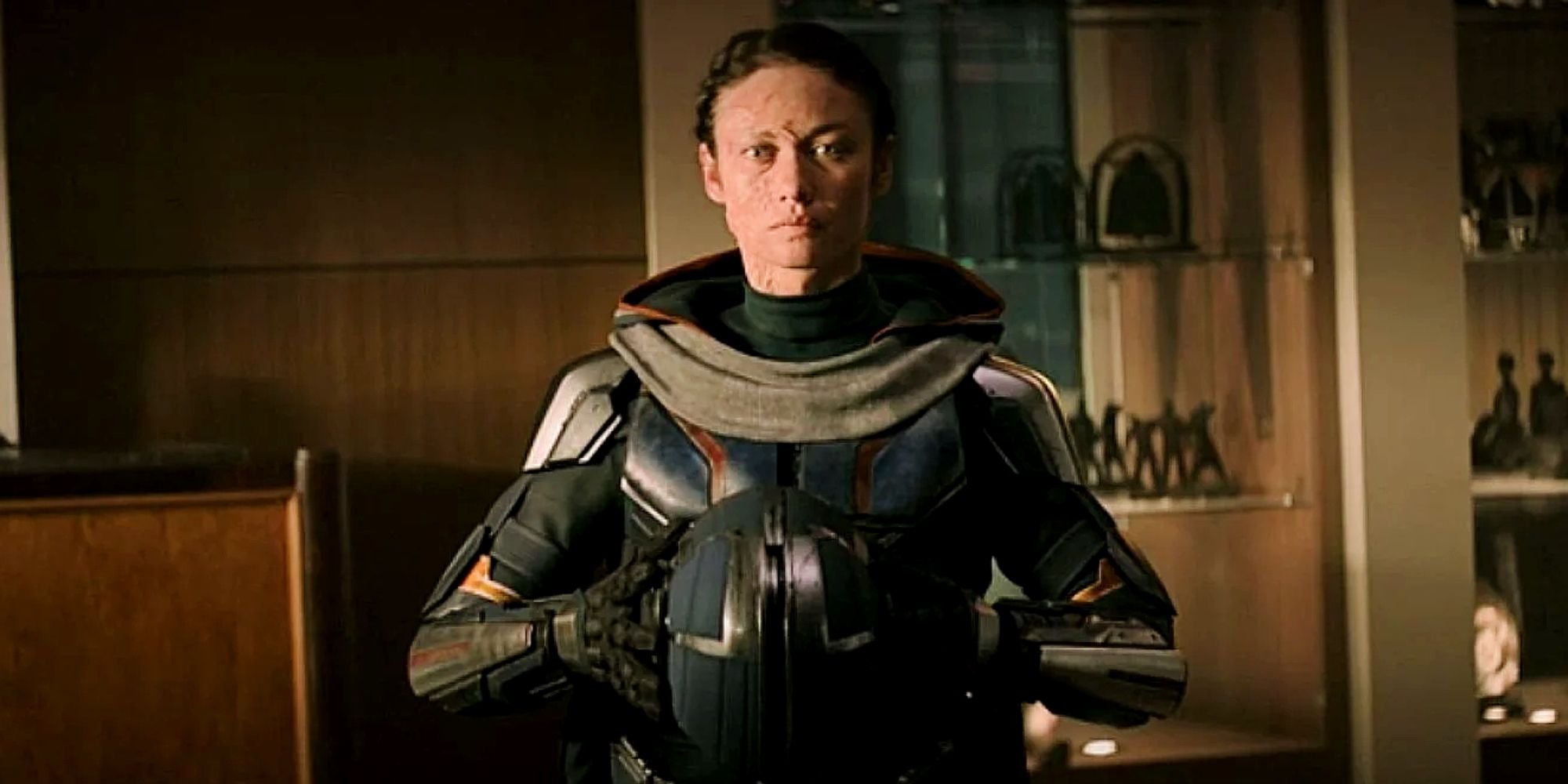

Caution: spoilers ahead for Black Widow
Which familiar MCU trope from Phase 3 does Black Widow rinse and repeat? Black Widow is somewhat of a curiosity in the Marvel Cinematic Universe canon. More or less every entry directly follows the last, and the time difference is negligible in those that don't. Black Widow, on the other hand, winds the clock way back to Captain America: Civil War and the immediate aftermath of the Sokovia Accords. Running from the U.S. government, Natasha Romanoff flees to Europe, only to discover some long-hidden skeletons aren't as buried as she thought. While fans walk into Black Widow already knowing the protagonist's fate, the unknown identity of Taskmaster provides an all-important source of intrigue.
If fighting back hordes of brainwashed Red Room agents wasn't troublesome enough, Natasha and Yelena learn that their former master, Ray Winstone's Dreykov, has a star pupil codenamed Taskmaster. This android-esque warrior is capable of replicating combat techniques on sight, allowing them to combine the best moves of Steve Rogers, T'Challa, Clint Barton, and various others. When the mask is finally lifted, Taskmaster is revealed as Antonia Dreykov - the daughter of the Red Room's commandant. Back when Natasha attempted to assassinate Dreykov in Budapest, she believed Antonia was caught in the blast as collateral damage. In fact, the child was pieced back together and turned into her old man's (almost) perfect assassin.
If that scenario feels a little familiar, MCU Phase 3 might be to blame. Between 2017 and 2018, Marvel released Thor: Ragnarok and Ant-Man & The Wasp, both featuring villains with backstories very similar to Taskmaster. In Thor: Ragnarok, Odin's death released Hela, the God of Thunder's very own sister. Played by Cate Blanchett, Hela was once Odin's greatest fighter, but she was ultimately imprisoned by her father, her name scrubbed from all Asgardian history. Needless to say, Hela isn't especially delighted upon her release. Less than a year later, Ant-Man & The Wasp arrived, with Ghost the primary villain. Originally known as Ava Starr, Ghost's father was a colleague of Hank Pym's who tried stealing Quantum Realm research. Rigging together some cowboy contraption of his own, Ava's father inadvertently turned his daughter into a transient being harnessing Quantum energy to phase through objects and turn invisible.

In all three cases, the daughter (Antonia Dreykov, Hela, Ava Starr) is turned villainous by the sins of their respective dads. Dreykov's callous human trafficking of young girls created a vengeful Natasha Romanoff, whose explosive assassination effort turned Antonia into Taskmaster. Odin's aggressive conquest of the Nine Realms corrupted Hela, who described herself as Odin's "weapon" during those early years. Though he was happy to nurture and exploit Hela's power initially, Odin opted to imprison Hela when her bloodlust grew too great, embittering the Asgardian princess further. Though Ghost blames Hank Pym more than her own father, it was Elihas Starr who tried to steal the original Ant-Man's work and then ignored the obvious risks by recreating the experiment in his own home. This trio of last-place father-of-the-year candidates were all motivated by a hunger for power - and their daughters paid the price.
Throughout the MCU, there's an overriding theme of heroes facing off against disgruntled family members, with Ego, Killmonger, and Loki also fitting that category. When it comes to female lead antagonists, however, there seems to be a recurring pattern of dark paternal backstories, in which the villain's sinister side is the direct result of terrible parenting. Though not exactly alike (switch father for mother), the same could also apply to WandaVision's Agatha Harkness, who was mistreated as a young apprentice witch and got sweet revenge by eclipsing her mother's power.
On one hand, the MCU's female villain trope serves as a commentary on how real-world badness is often learned behavior. Very few folks are born inherently evil, but rather learn to be, usually through the actions of their parents, and films such as Black Widow, Thor: Ragnarok and Ant-Man & The Wasp reflect this. But the trope could also be considered proof of unvaried female villains in the franchise, with Marvel returning to the same "my dad made me do it" storyline over and over again.
https://ift.tt/3rA09Na
No hay comentarios:
Publicar un comentario